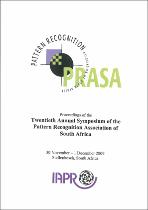JavaScript is disabled for your browser. Some features of this site may not work without it.
- ResearchSpace
- →
- Research Publications/Outputs
- →
- Conference Publications
- →
- View Item
| dc.contributor.author |
Barnard, E

|
|
| dc.date.accessioned | 2012-02-15T09:03:02Z | |
| dc.date.available | 2012-02-15T09:03:02Z | |
| dc.date.issued | 2009-11 | |
| dc.identifier.citation | Barnard, E. The challenges of ignorance. 20th Annual Symposium of the Pattern Recognition Association of South Africa (PRASA), Stellenbosch, South Africa, 30 November-01 December 2009, pp 7-10 | en_US |
| dc.identifier.isbn | 978-0-7992-2356-9 | |
| dc.identifier.uri | http://www.prasa.org/proceedings/2009/prasa09-02.pdf | |
| dc.identifier.uri | http://hdl.handle.net/10204/5571 | |
| dc.description | 20th Annual Symposium of the Pattern Recognition Association of South Africa (PRASA), Stellenbosch, South Africa, 30 November-01 December 2009 | en_US |
| dc.description.abstract | The authors have previously argued that the infamous "No Free Lunch" theorem for supervised learning is a paradoxical result of a misleading choice of prior probabilities. Here, they provide more analysis of the dangers of uniform densities as ignorance models, and point out the need for a framework that allows for prior probabilities to be constructed in a more principled fashion. Such a framework is proposed for the task of supervised learning, based on the trend of the Bayes error as a function of the number of features employed. Experimental measurements on a number of standard classification tasks confirm the representational utility of the proposed approach. | en_US |
| dc.language.iso | en | en_US |
| dc.publisher | PRASA | en_US |
| dc.subject | Ignorance models | en_US |
| dc.subject | Supervised learning | en_US |
| dc.subject | Bayes error | en_US |
| dc.title | The challenges of ignorance | en_US |
| dc.type | Conference Presentation | en_US |
| dc.identifier.apacitation | Barnard, E. (2009). The challenges of ignorance. PRASA. http://hdl.handle.net/10204/5571 | en_ZA |
| dc.identifier.chicagocitation | Barnard, E. "The challenges of ignorance." (2009): http://hdl.handle.net/10204/5571 | en_ZA |
| dc.identifier.vancouvercitation | Barnard E, The challenges of ignorance; PRASA; 2009. http://hdl.handle.net/10204/5571 . | en_ZA |
| dc.identifier.ris | TY - Conference Presentation AU - Barnard, E AB - The authors have previously argued that the infamous "No Free Lunch" theorem for supervised learning is a paradoxical result of a misleading choice of prior probabilities. Here, they provide more analysis of the dangers of uniform densities as ignorance models, and point out the need for a framework that allows for prior probabilities to be constructed in a more principled fashion. Such a framework is proposed for the task of supervised learning, based on the trend of the Bayes error as a function of the number of features employed. Experimental measurements on a number of standard classification tasks confirm the representational utility of the proposed approach. DA - 2009-11 DB - ResearchSpace DP - CSIR KW - Ignorance models KW - Supervised learning KW - Bayes error LK - https://researchspace.csir.co.za PY - 2009 SM - 978-0-7992-2356-9 T1 - The challenges of ignorance TI - The challenges of ignorance UR - http://hdl.handle.net/10204/5571 ER - | en_ZA |






